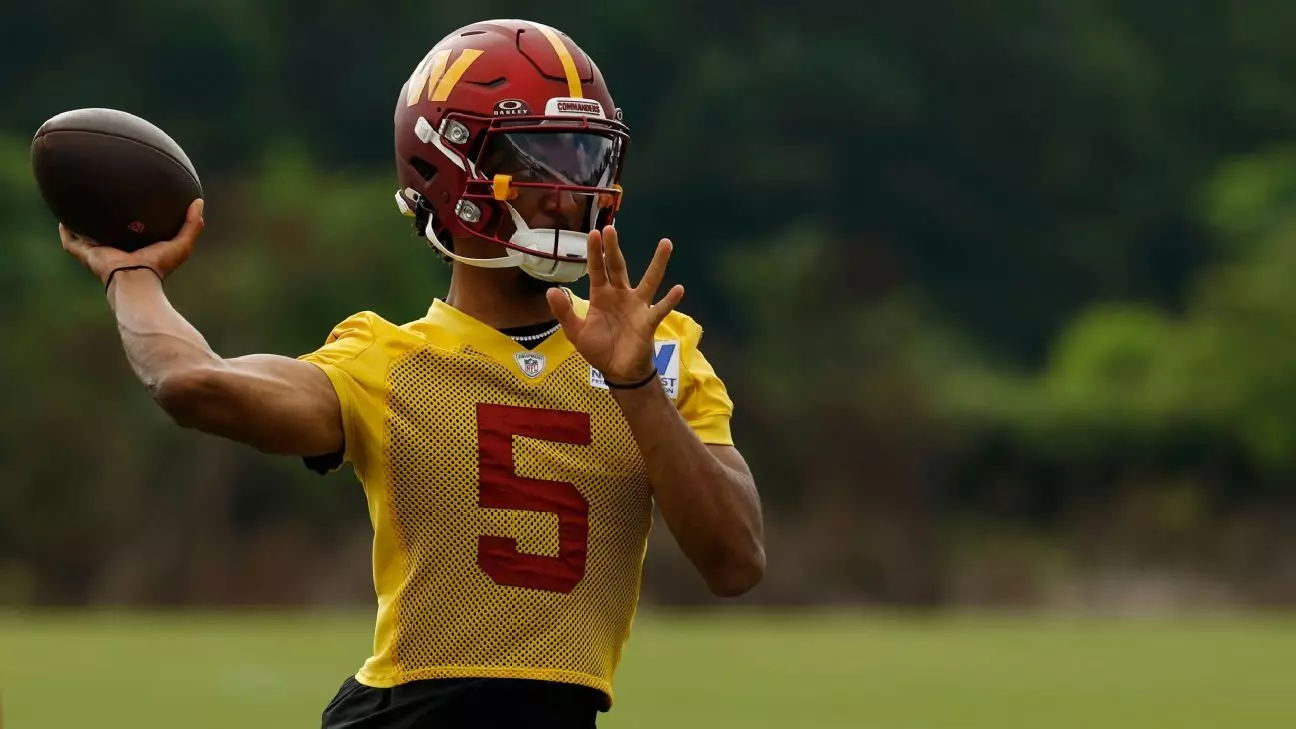In the ever-evolving landscape of professional football, few stories are as compelling as the rise of a young quarterback who transitions from learning the ropes to commanding his team with authority. Jayden Daniels’ journey with the Washington Commanders exemplifies this transformative process. His statement about experiencing “night and day” change highlights the often-overlooked reality of athlete growth: it’s as much mental as it is physical. While such development is celebrated publicly as a sign of maturity, a critical look reveals that this evolution is rooted not just in familiarity but in a profound internal shift—an emergence of confidence coupled with a sharpened understanding of leadership responsibilities.
Despite his impressive rookie accomplishments—finishing seventh in MVP voting and earning the NFL’s Offensive Rookie of the Year award—Daniels recognized early on that mastery of the offense was only part of his progression. His acknowledgment of being more comfortable within the system signifies a significant leap, but it’s the added dimension of leadership that truly marks his breakthrough. The transition from a player focused solely on individual performance to one actively shaping team dynamics is a critical juncture in any athlete’s career, and Daniels appears to have embraced it wholeheartedly. His readiness to correct teammates publicly signals an internalization of his role as a leader—a role that requires not just skill but also the unwavering confidence to uphold team standards.
Understanding the Power of Experience and Confidence
The insights offered by Coach Dan Quinn underscore the importance of experience in accelerating a player’s development. Quinn’s observation that Daniels’ decision-making and processing speed have improved with time in the system aligns with well-established principles of athletic growth. When athletes gain familiarity, their reactions become swifter, their reads more precise, and their confidence sharper. However, stepping beyond mere competence into leadership involves a different mindset—one that demands taking on responsibility for the team’s culture and discipline.
Daniels’ candid admission that he now sees leadership as integral to his role demonstrates a significant shift. Instead of deferring to coaches or staying in a purely execution-focused frame, he recognizes that his authority can motivate and elevate others. His willingness to enforce standards—such as removing a teammate from the huddle after a false start—reflects a crucial understanding: leadership is about accountability, not just individual excellence. Such actions don’t just improve on-field performance but foster a culture of discipline and high standards that can propel a team forward.
Leadership by Example: A Double-Edged Sword
While Daniels’ ascent into leadership can be celebrated, it warrants a nuanced critique. Leadership qualities—like chastising teammates or holding others accountable—are invaluable, but they also come with risks. The question arises: Is Daniels prepared to sustain this level of authority without alienating teammates? The fine line between assertiveness and arrogance is delicate, and a young leader must balance confidence with humility. Nonetheless, his recent actions suggest he is aware of this responsibility and is actively cultivating it.
Furthermore, his increased comfort level in the offense grants him the tools to adapt and respond to different situations efficiently. The ability to “get to different protections and runs” based on protections by reading defenses is noteworthy, but it also hints at a larger truth: mastery of the tools empowers leadership. When players understand not just how to execute but why they do so, their confidence naturally extends into guiding others. Daniels’ mindset indicates he recognizes this, embracing the dual roles of performer and leader with genuine intent.
The Crucial Role of Mental Maturity in Athletic Growth
The narrative of Daniels’ development underscores a broader truth about athletic excellence: technical skill alone is insufficient without mental maturity. Confidence, decisiveness, responsibility—these are qualities that can only be cultivated through experience and introspection. His readiness to enforce standards and take leadership initiatives suggests a mental shift from self-centric achievement to team-centric accountability.
Critically, this transition is often overlooked or undervalued in discussions about player development. Physical talent can be developed rapidly, but psychological maturity takes time and deliberate effort. Daniels’ evolution reveals that true leadership is rooted in internal conviction—believing in one’s role, being willing to uphold standards, and inspiring others by example. That he recognizes this signifies not just growth but a readiness to take the next big step in his career: becoming an indispensable leader, not just a promising player.


Leave a Reply